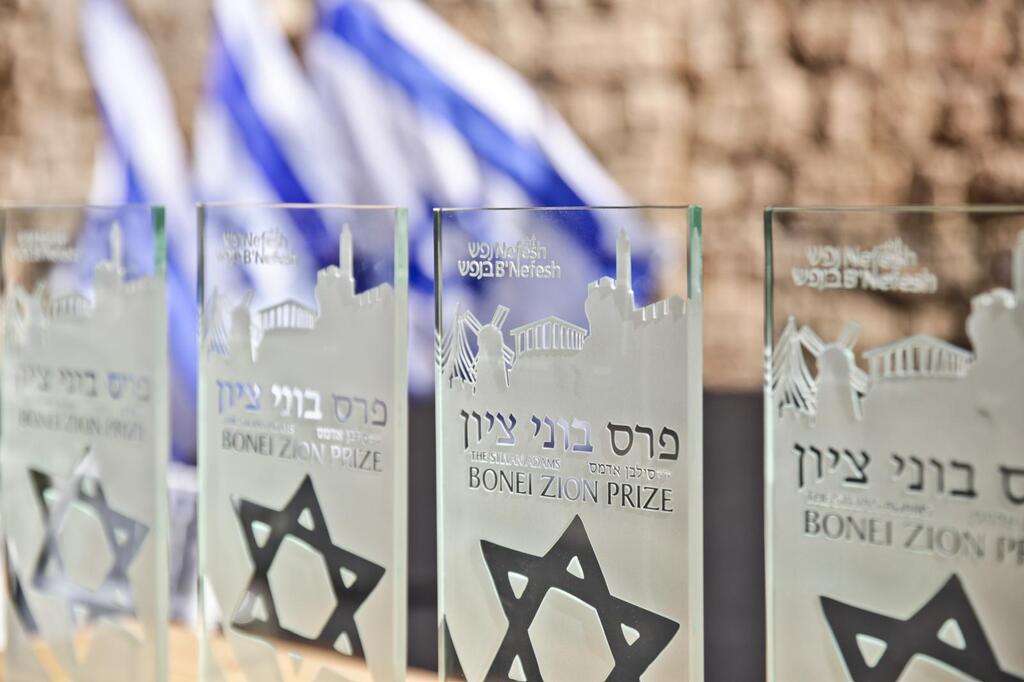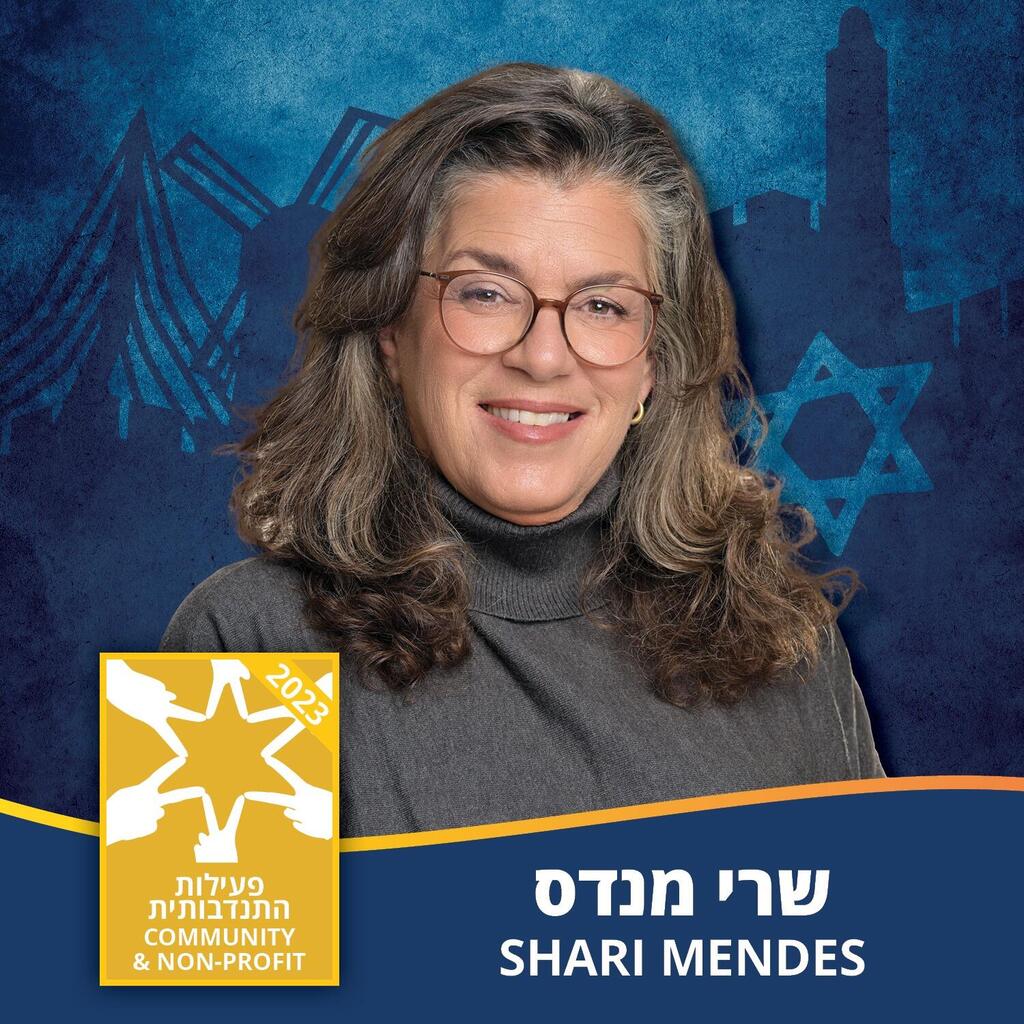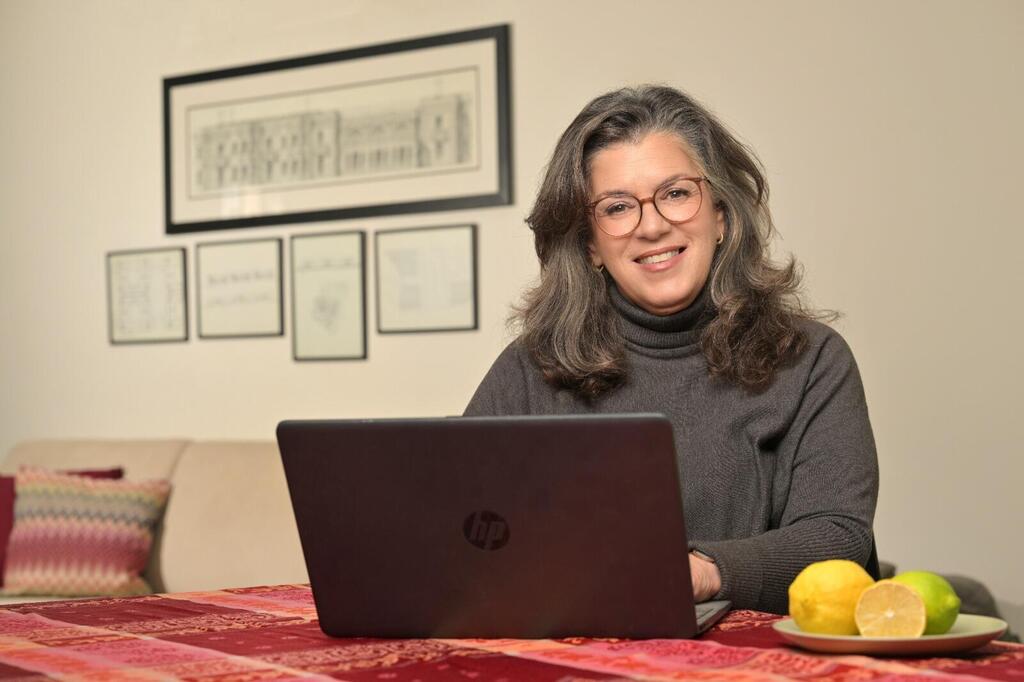Getting your Trinity Audio player ready...
The Sylvan Adams Nefesh B’Nefesh Bonei Zion Prize ceremony was held Monday evening in Jerusalem, honoring Olim who have significantly contributed to Israel. The event was broadcast live on Ynetnews.
Among the recipients is Shari Mendes, who transformed her life path after making Aliyah, by establishing a non-profit organization that provides financial assistance to women with breast cancer. In addition, this past year further deepened her connection to Israel and Zionism. Just as her grandmother's brother retrieved bodies from the gas chambers in Auschwitz, on October 7, Mendes volunteered with a team identifying victims of the massacre.
Nefesh B'Nefesh honors, each year, Olim from English-speaking countries who have made a significant impact on Israeli society. This year marks the 10th ceremony, and is being held at the Beit Ha’am Cultural Center in Jerusalem.
The awards will be presented to 12 Olim who have strengthened Israeli society and advanced Zionist values across fields such as education, culture, arts and sports, science and medicine, community and non-profit, and global impact.
Among the award winners are Eylon Levy, head of the Israel Citizen Spokespersons’ Office; Fleur Hassan-Nahoum, Special Envoy of the Ministry of Foreign Affairs; Dr. Debra Gershov-West, Director of the Department of Emergency Medicine at Assuta Ashdod University Hospital; Phyllis Heimowitz, Co-Founder of the Partners of Fallen IDF Soldiers; Lt. Col. (res.) Danny Grossman, Chairman, CMBM-Israel; and Emily Schrader, journalist and human rights activist. Watch the ceremony live at the top of the page
To immigrate to Israel and build the country
One of the winners of the Bonei Zion Prize for Community and Non-Profit is Shari Mendes, Founder and CEO of “Lemonade Israel.” Mendes, born in Pennsylvania, immigrated to Israel 21 years ago with her husband and teenage children, with the assistance of Nefesh B’Nefesh and in cooperation with the Ministry of Aliyah and Integration, The Jewish Agency for Israel, Keren Kayemeth LeIsrael and JNF-USA. The decision at the age of 40 to leave behind family, friends and established careers - hers in architecture and her husband’s, Dr. David Mendes, as a surgeon - was not easy. But the challenges did not deter her, and she was determined to fulfill her dream of making Aliyah.
Mendes' love for Israel began at the age of 17 during a family visit: "I fell in love. Even then I decided that I had to live here; it felt like home to me," she said. "I grew up in a small town in Pennsylvania, and we didn't have a large Jewish community. I loved the idea of Zionism, to be part of something bigger. Maybe that's why I chose to study architecture - to immigrate to Israel and help build the country."
At Columbia University, where she studied architecture, she met her future husband, David, an Israeli who moved to the U.S. at a young age with his family as part of an emissary mission. It was also clear to him that the day would come to return to Israel. In 2003, after years of sharing this dream, they took the leap and made Aliyah, settling in Ra'anana.
"It was during the intifada, and not many immigrants were moving at that time. It was a challenge, but we managed to build a warm community of friends for ourselves. It was also difficult for the children, but they acclimated. They joined the army, studied, got married and started families here of their own. A month ago my first granddaughter was born," she shared excitedly.
Making lemonade from lemons
The dream of living an idyllic life in Israel was challenged in 2010, when Mendes underwent a routine mammogram where a cancerous lump was discovered. "I entered the examination healthy and came out sick. In one minute, my whole life changed," she said. Fortunately, the cancer was diagnosed at an early stage, which allowed for life-saving treatment - a message she emphasizes to every woman over 40.
The first year of her illness was difficult, with long and exhausting treatments. In the waiting rooms between treatments, Mendes met many women in similar circumstances. She was amazed to discover that many sick women were more preoccupied with financial struggles than their health or taking care of their families.
"This is a long period of treatment that hurts the patients financially, as well. Some are single mothers, while others, especially this past year, have spouses in the reserves and have to take care of themselves alone, including mortgage payments, babysitters, taxis, and food."
Mendes emphasized that the medical system in Israel, when it comes to cancer treatment, is very advanced and breast cancer awareness is growing. But the economic concerns that consume the patients do not receive enough attention.
After meeting a cancer patient at the clinic who couldn’t afford a washing machine, Mendes picked up the gauntlet and helped her purchase the machine through donations. From there, things progressed quickly, and Mendes found herself, while simultaneously undergoing treatments, establishing "Lemonade Israel", an organization supporting breast cancer patients facing financial distress during treatments.
It started small in Meir Hospital, but very quickly the organization’s activities expanded to almost all hospitals in the country. 14 and a half years after she founded the organization, "Lemonade Israel" is still the only resource for women who struggle to meet the many expenses associated with treatment. The organization provides financial support to every woman diagnosed with breast cancer, "including one percent of male breast cancer patients," notes Mendes. “I’m safest living here.”
*Warning: The following paragraphs contain descriptions that might be difficult to read.
Over the past year, in addition to her growing efforts to assist breast cancer patients, which has become a full-time job and more, Mendes has reluctantly become the voice of women on another front: the victims of the October 7 massacre.
A decade ago, Mendes, alongside other women, joined a volunteer unit of the IDF Rabbinate to identify and prepare the bodies of female soldiers' for burial. "There wasn't much activity in the unit, but a few months before the war, the volunteering shifted to reserve service, and we began training."
Then came October 7, and nothing could have prepared Mendes and her colleagues for the critical role they would play. In her chilling testimony, Mendes tells of the unimaginable amounts of body bags that were piled up for days at the Shura military base, where she reported for reserve duty. "Our mission wasn’t forensic but religious. We opened the body bags and gave the women the dignity that the Hamas terrorists had violated. We removed jewelry and any identifying items to return them to their families."
Get the Ynetnews app on your smartphone: Google Play: https://bit.ly/4eJ37pE | Apple App Store: https://bit.ly/3ZL7iNv
For over a year, Mendes has been traveling the world on advocacy missions, interviewing with foreign media channels and delegations to the United Nations, to share her testimony. Unfortunately, alongside immense support she has received, she also has faced voices denying the October 7 massacre. "It comes through horrifying questions, such as - why weren’t rape tests conducted?"
You describe such difficult and traumatic scenes, how do you deal with it?
"We are a team of strong women, and it was better that we did it than 18-year-old young soldiers. I come from a family of Holocaust survivors. My grandmother's brother was in the Sonderkommando in Auschwitz. His job was to take corpses out of the gas chambers. He was only 20 years old. On October 7, I realized that if he could do that, I could too. The thought of him made me stronger."
In 2023 you mentioned 20 years since immigrating to Israel. How did October 7 change your perception of Israel?
"It only made me stronger and proved to me that it was the right decision to immigrate to Israel. Every day I pinch myself, and I can't believe that I have the right to live here. I'm happy that I'm a Jew living in this country. I'm not afraid, on the contrary. I'm safest being a Jew here."




